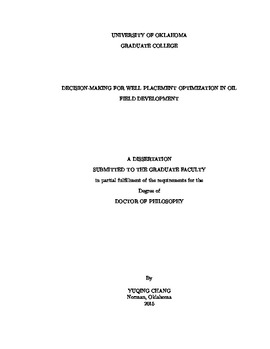| dc.contributor.advisor | Devegowda, Deepak | |
| dc.contributor.author | Chang, Yuqing | |
| dc.date.accessioned | 2015-12-18T14:50:36Z | |
| dc.date.available | 2015-12-18T14:50:36Z | |
| dc.date.issued | 2015 | |
| dc.identifier.uri | https://hdl.handle.net/11244/23314 | |
| dc.description.abstract | Well placement is a method to improve oil recovery by drilling new infill wells in a reservoir. Drilling new wells is a critical yet very challenging task in field development, because the optimal well locations are rarely known and difficult to decide in practice due to complex reservoir and depletion situations. This dissertation focuses on the development of mathematical optimization techniques to assist decision-making for well planning and placement. The following topics are included in this dissertation.
1. To study and develop two stochastic approximated gradient-based approaches: the ensemble based optimization method (EnOpt) and the fixed-gain simultaneous perturbation stochastic approximation (FSP) for well placement; Evaluate the performance and effectiveness of these two methods on case studies.
2. To develop an efficient method to decide optimal number of wells and the corresponding locations, evaluate the performance on study cases.
3. To handle geological uncertainty and decision-making risk, propose a new workflow for multi-objective well placement optimization.
4. To ensure an efficient decision-making and a fast turnaround time, the use of engineering prior knowledge and a few acceleration routines are discussed in the context of optimization.
All approaches are evaluated on synthetic reservoir models, some are performed on real field-like cases. This dissertation provides various optimization methods with an enhanced capability of addressing geological uncertainty for well placement in oilfield development. However, it should also be noted that while the techniques proposed in this dissertation are applicable to a diverse set of reservoirs with no known limitations, the additional value of this dissertation lies in its ability to address well placement needs for highly complex reservoirs. For reservoirs that lack the complexity seen, for example, in deepwater basins, conventional well placement methods may be sufficient. | en_US |
| dc.language | en_US | en_US |
| dc.subject | reservoir simulation | en_US |
| dc.subject | well placement | en_US |
| dc.subject | engineering optimization | en_US |
| dc.title | Decision-Making for Well Placement Optimization in Oil Field Development | en_US |
| dc.contributor.committeeMember | Rai, Chandra S. | |
| dc.contributor.committeeMember | Sondergeld, Carl | |
| dc.contributor.committeeMember | Wu, Xingru | |
| dc.contributor.committeeMember | Lakshmivarahan, S. | |
| dc.contributor.committeeMember | Trafalis, Theodore B. | |
| dc.date.manuscript | 2015-10-02 | |
| dc.thesis.degree | Ph.D. | en_US |
| ou.group | Mewbourne College of Earth and Energy::Mewbourne School of Petroleum and Geological Engineering | en_US |
| shareok.orcid | 0000-0002-6954-1097 | en_US |
| shareok.nativefileaccess | restricted | en_US |
